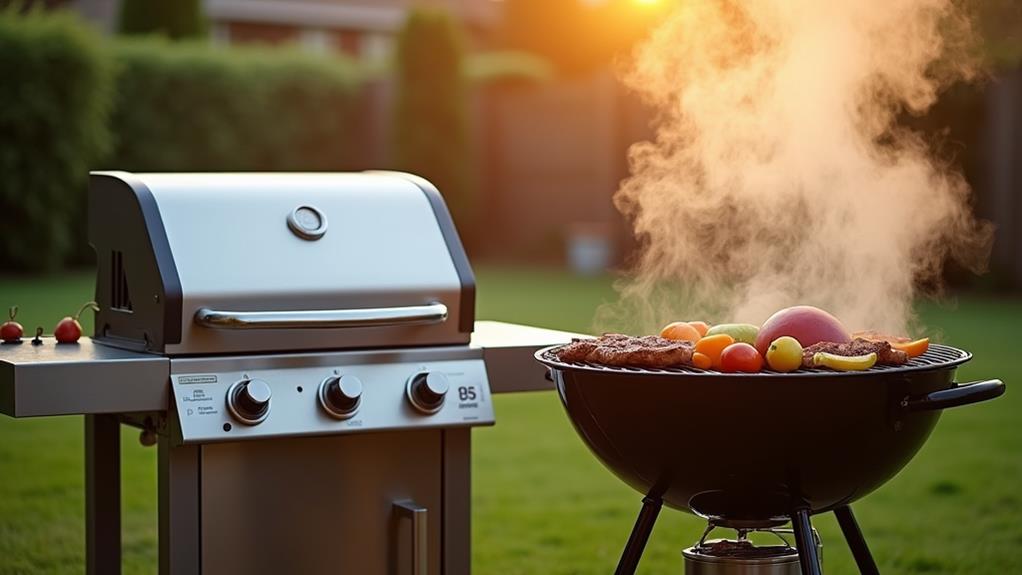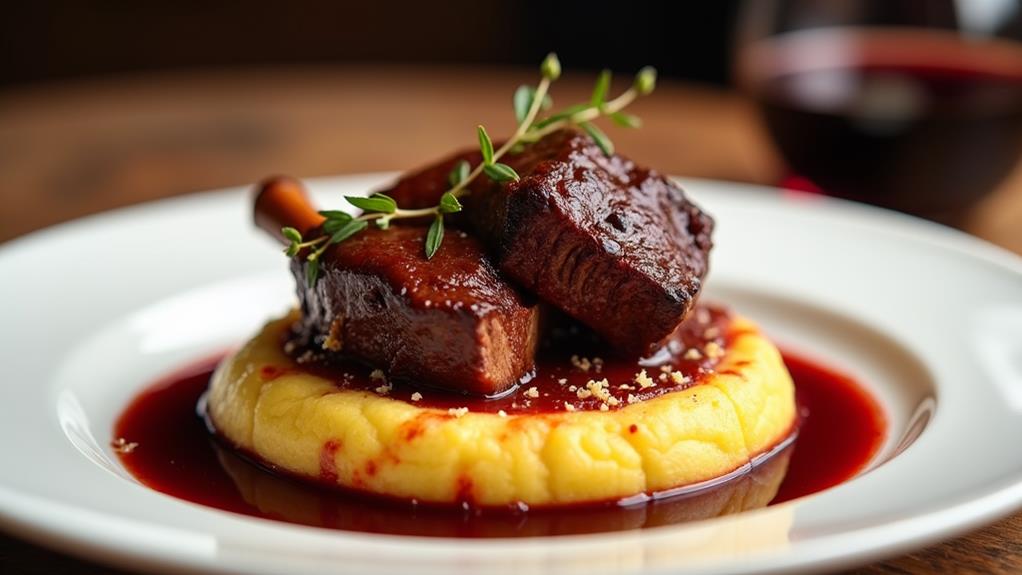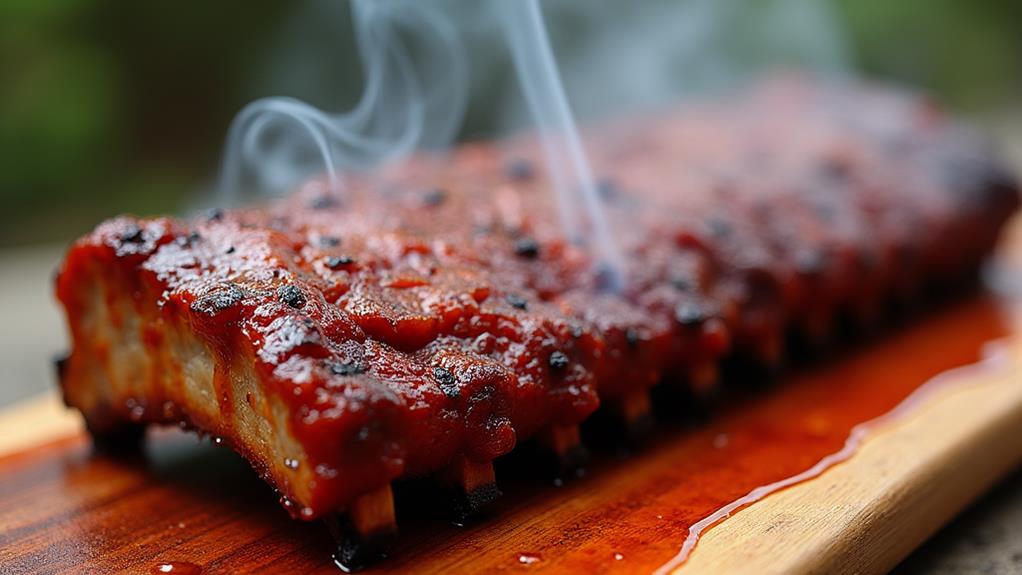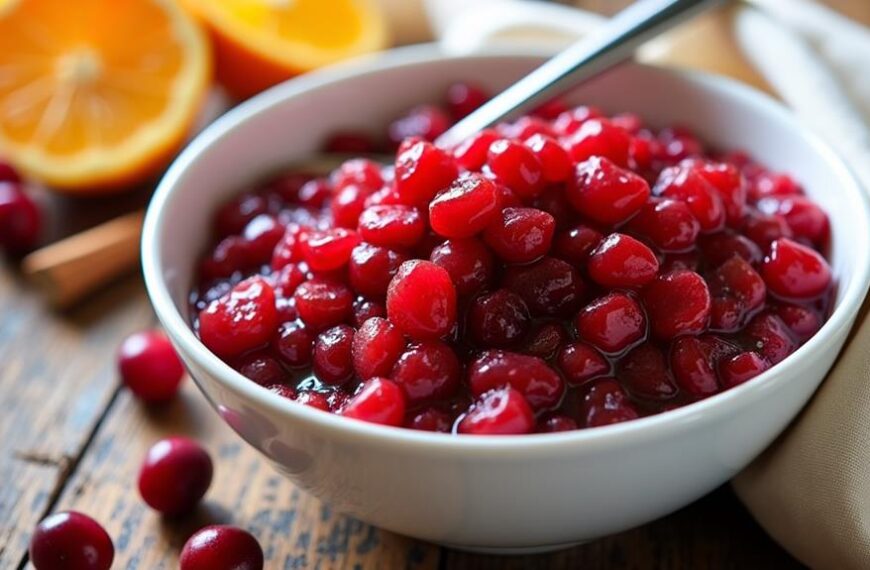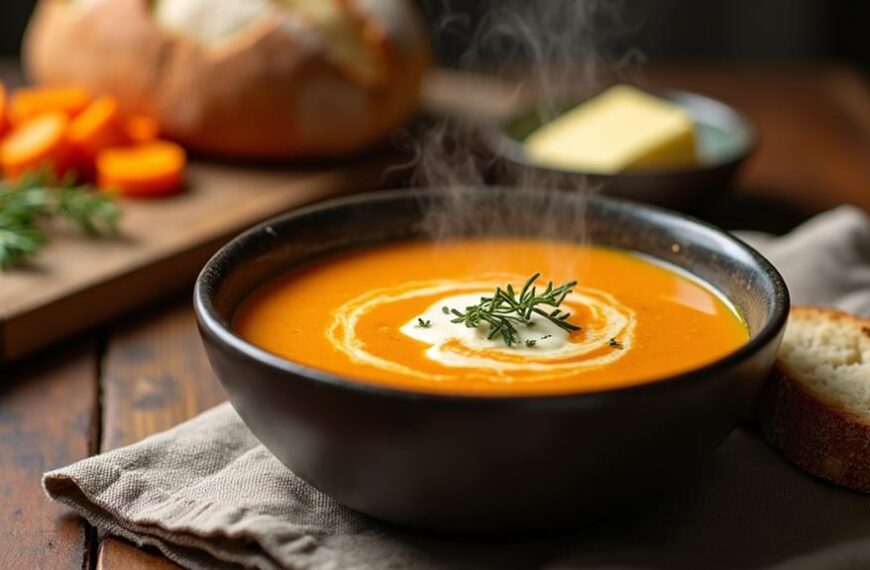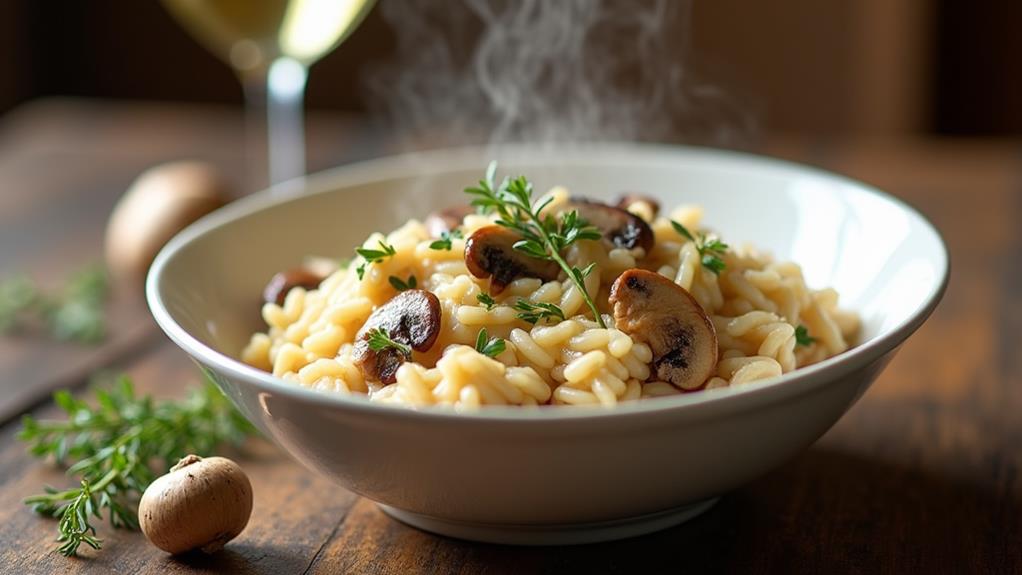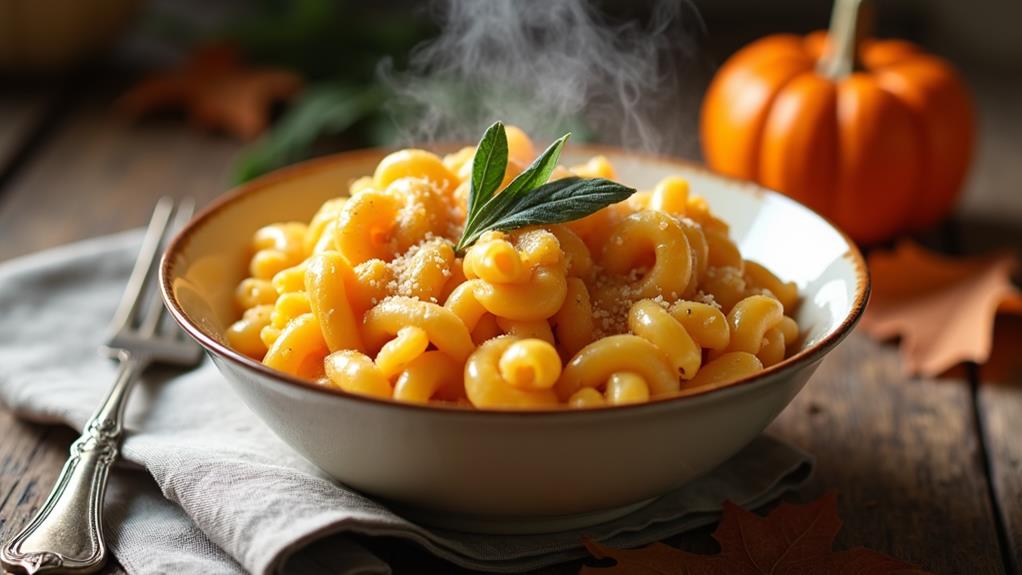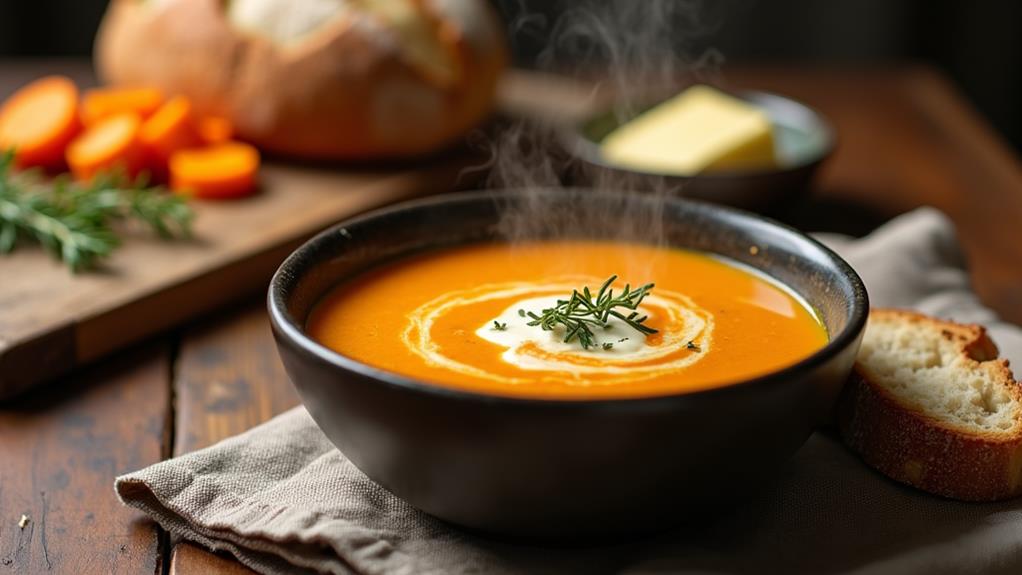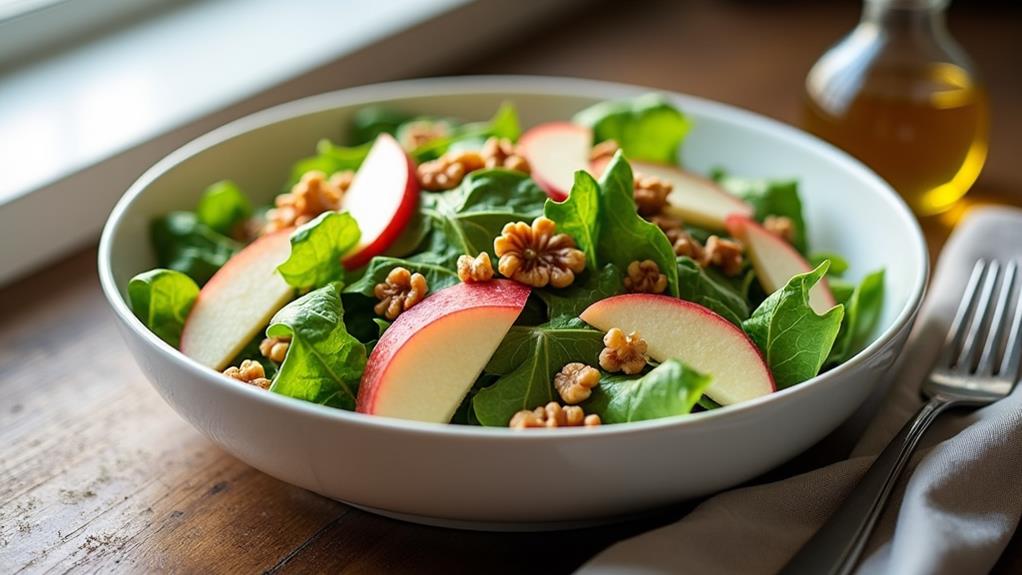When you're choosing between charcoal and gas grills, you're selecting between two distinct grilling experiences. Charcoal grills offer intense smoky flavors and require hands-on temperature control, perfect for enthusiasts who enjoy the process. Gas grills, on the other hand, provide convenience with precise heat management and quick start-up times, ideal for busy cooks. Both have their strengths in flavor production, temperature regulation, and maintenance needs. Your decision will depend on your priorities: the rich, smoky taste and involvement of charcoal, or the efficiency and ease of gas. As you explore each option, you'll uncover the nuances that make outdoor cooking an art form.
The Grilling Battlefield
Passion ignites as grill enthusiasts square off in the age-old debate: charcoal or gas?
You're about to enter the grilling battlefield, where fuel sources and cooking styles clash in a smoky showdown. As you navigate this culinary conflict, you'll discover how each option affects your outdoor cooking experience.
Charcoal grills offer intense smoke and unparalleled flavor profiles, perfect for those seeking traditional tastes.
You'll find that mastering charcoal grilling techniques requires patience and skill, but the results can be extraordinary.
On the other hand, gas grills provide convenience and precise heat distribution, allowing you to experiment with various cooking styles effortlessly.
To elevate your grilling game, consider investing in grill accessories tailored to your chosen fuel source.
These tools can enhance your control over smoke intensity and heat management, regardless of your preferred method.
As you explore different grilling techniques, you'll develop a deeper appreciation for the nuances of each approach.
Charcoal's Fiery Appeal
Smoke billows and flavors intensify as charcoal grills ignite the senses. You'll discover that charcoal grilling offers an unparalleled experience, combining primal cooking methods with modern techniques.
The allure of charcoal lies in its ability to create a unique flavor profile, infusing your food with a smoky essence that gas grills simply can't replicate.
When you opt for charcoal, you're choosing a hands-on approach that demands skill and patience. You'll learn to master temperature control by adjusting airflow and manipulating coal placement.
This level of engagement allows for precise flavor infusion, as you can add wood chips or chunks directly to the coals for enhanced smokiness.
Charcoal's versatility shines through its ability to achieve both high-heat searing and low-and-slow cooking. You'll find that it excels at creating a perfect crust on steaks while maintaining a juicy interior.
For longer cooks, like briskets or ribs, charcoal provides consistent heat and imparts a deep, rich flavor that develops over time.
Embrace the art of charcoal grilling, and you'll elevate your outdoor cooking to new heights.
Gas Grill's Modern Efficiency
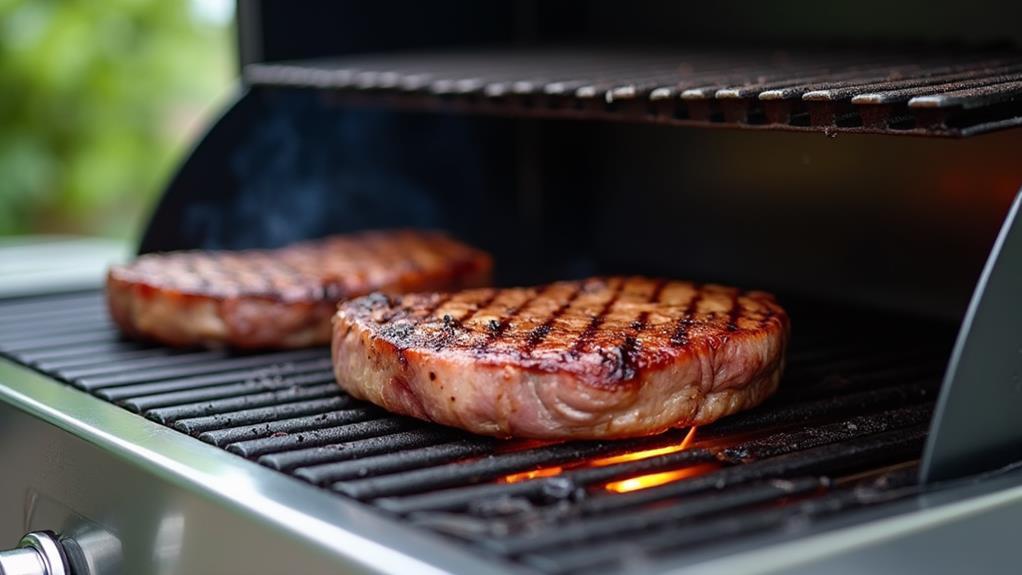
While charcoal grilling offers a traditional experience, gas grills bring modern convenience to outdoor cooking.
You'll find that gas grills leverage cutting-edge grill technology to deliver consistent results with minimal effort. These appliances feature precise temperature controls, allowing you to set and maintain the perfect heat for various dishes.
The advanced heat distribution systems ensure even cooking across the entire grilling surface, eliminating hot spots and cold zones.
Gas grills often come equipped with multiple burners, giving you the flexibility to create different temperature zones for simultaneous cooking of various foods. You can sear steaks on high heat while gently roasting vegetables on a lower setting.
Many models also include built-in thermometers, side burners, and rotisserie attachments, expanding your culinary possibilities. The push-button ignition systems make starting your grill a breeze, and you won't need to wait for coals to heat up.
With a gas grill, you're ready to cook in minutes, making it ideal for weeknight dinners or impromptu gatherings.
These grills also offer easier cleanup, as there's no ash to dispose of after cooking.
Flavor Face-Off
The flavor battleground is where charcoal and gas grills truly compete for supremacy. When you're aiming for that perfect smoky taste, charcoal grills often take the lead. They impart rich, smoky nuances to your food that gas grills struggle to replicate. The natural wood smoke from charcoal creates complex flavor profiles, enhancing everything from steaks to vegetables, much like how roasted root vegetables can be enhanced by tossing them with olive oil and herbs.
However, don't count gas grills out just yet. While they may not match the intense smokiness of charcoal, they offer consistency and control. You'll find it easier to maintain a steady temperature, allowing for precise cooking of delicate foods. Some gas grills come equipped with smoke boxes or flavored wood chips, bridging the gap in taste.
To maximize flavor on a gas grill, try using a cast-iron skillet for searing or invest in a high-quality smoker box. For charcoal enthusiasts, experiment with different wood types to create unique flavor combinations. Hickory, mesquite, and applewood each bring distinct characteristics to your grilled masterpieces.
Ultimately, the choice between charcoal and gas comes down to your preference for smoky intensity versus convenience and control.
Convenience and Time Management
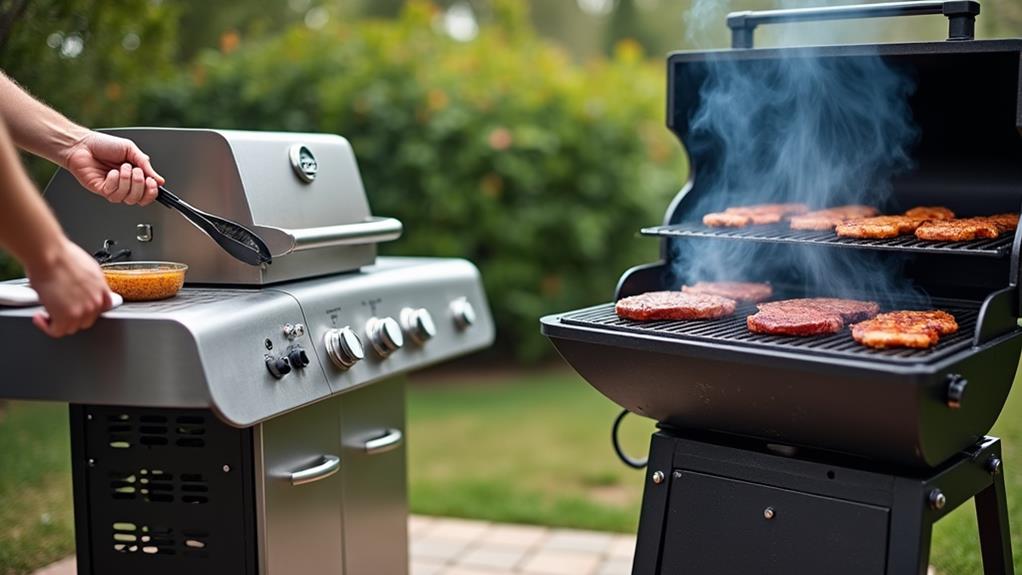
When it comes to convenience and time management, gas grills often edge out their charcoal counterparts. You'll find that gas grills offer a streamlined grill setup process, allowing you to fire up and start cooking in minutes. This quick start feature is particularly beneficial when you're juggling a tight cooking schedule or entertaining guests.
With a gas grill, you can easily control the temperature, making it simpler to plan and execute your meal timing. You won't need to wait for charcoal to heat up or struggle with maintaining consistent heat levels. Instead, you'll have precise control at your fingertips, enabling you to seamlessly transition between high-heat searing and low-and-slow cooking.
Moreover, gas grills offer the advantage of easy cleanup. You won't have to deal with ash disposal or the messy aftermath of charcoal. This time-saving aspect can be crucial when you're managing a busy lifestyle or hosting frequent barbecues.
Temperature Control Showdown
Let's dive into the temperature control showdown between charcoal and gas grills. When it comes to mastering smoky nuances and perfecting your grilling techniques, temperature control is crucial.
Gas grills offer precise temperature management through adjustable burners, allowing you to set and maintain specific heat levels effortlessly. You'll find it easier to create different heat zones for various cooking methods, from searing to slow-roasting.
Charcoal grills, on the other hand, require more skill and attention. While they may not provide the same level of precision, they offer unparalleled flexibility in heat manipulation. By arranging coals strategically, you can create diverse temperature zones within your grill. This method allows for more creative grilling techniques, such as indirect cooking and smoking.
To achieve optimal temperature control with a charcoal grill, you'll need to master airflow regulation using vents. Opening vents increases oxygen flow, raising temperatures, while closing them reduces heat.
This hands-on approach gives you the power to fine-tune your grill's temperature, resulting in more complex flavors and that sought-after smoky essence. Ultimately, your choice depends on your desired level of involvement and the specific flavors you aim to achieve.
Maintenance and Longevity

When considering the maintenance and longevity of your grill, you'll need to weigh the cleaning requirements and durability of both charcoal and gas options.
Charcoal grills typically require more frequent cleaning due to ash buildup, while gas grills need regular checks on burners and gas lines.
Your choice between the two will impact not only your grilling experience but also the long-term care and lifespan of your outdoor cooking companion.
Cleaning and Upkeep
Maintenance is a crucial factor when choosing between charcoal and gas grills. Your cleaning techniques and upkeep routines will significantly impact your grilling experience and the longevity of your equipment.
For charcoal grills, you'll need to regularly remove ash and debris, scrub the grates with a wire brush, and occasionally oil them to prevent rust.
Gas grills require a different approach: you'll clean the burners, check for gas leaks, and ensure the ignition system is functioning properly.
To streamline your cleaning process, consider innovative tools like steam cleaners or specialized grill brushes. These can make your upkeep more efficient and effective.
For both types of grills, it's essential to cover them when not in use to protect against the elements. You should also perform a deep clean at least once a season, disassembling parts for thorough scrubbing and inspection.
By incorporating these practices into your routine, you'll not only extend the life of your grill but also ensure consistently delicious results.
Durability and Lifespan
Although both types of grills can last for many years, their durability and lifespan largely depend on the quality of materials used and how well you maintain them.
Charcoal grills, often simpler in design, can withstand the test of time if constructed with high-grade metals. You'll find that well-built charcoal grills made of thick steel or ceramic can serve you for decades, with user experiences often praising their longevity.
Gas grills, on the other hand, have more complex components that may require replacement over time. However, innovations in material quality have led to the development of stainless steel burners and heat shields that resist corrosion and wear.
To maximize your grill's lifespan, regardless of type, you should invest in a model with superior construction and follow proper maintenance routines. Regular cleaning, protecting your grill from the elements, and addressing issues promptly will significantly extend its service life.
Frequently Asked Questions
Can I Convert My Charcoal Grill to a Gas Grill?
You can't directly convert your charcoal grill to gas, but you're not out of options. Consider a hybrid grill for versatility or a gas insert for improved efficiency. These innovations let you enjoy the best of both grilling worlds.
Are There Hybrid Grills That Use Both Charcoal and Gas?
Yes, you'll find innovative hybrid grill options that combine charcoal and gas advantages. You can enjoy the best of both worlds, switching between fuel types for versatile cooking. These cutting-edge grills offer unparalleled flexibility for your outdoor culinary adventures.
How Do Weather Conditions Affect Charcoal Versus Gas Grilling Performance?
You'll find weather impacts both grill types. Coincidentally, humidity's impact on charcoal is significant, while gas grills remain stable. Temperature fluctuations affect charcoal more, but innovative gas grills now offer precise control, adapting to various conditions effortlessly.
Which Type of Grill Is More Environmentally Friendly?
You'll find gas grills are generally more eco-friendly. They're more efficient and produce fewer emissions than charcoal. However, if you're innovative, you can explore eco-charcoal options or even electric grills for a greener grilling experience.
Are There Any Health Concerns Associated With Charcoal or Gas Grilling?
Like playing with fire, grilling comes with risks. You'll want to mind grilling safety and smoke exposure. Both charcoal and gas can produce potentially harmful compounds, so proper ventilation and cooking techniques are key to innovative, healthier grilling.
Final Thoughts
As you've journeyed through the smoky battlefield of grilling, you've seen that both charcoal and gas have their merits. While charcoal offers unparalleled flavor that'll make your taste buds dance the tango, gas grills provide unmatched convenience. Your choice ultimately depends on your priorities: flavor, time, or control. Whichever you pick, remember that practice makes perfect. So fire up that grill, embrace the learning curve, and soon you'll be serving up plates of barbecue bliss.

